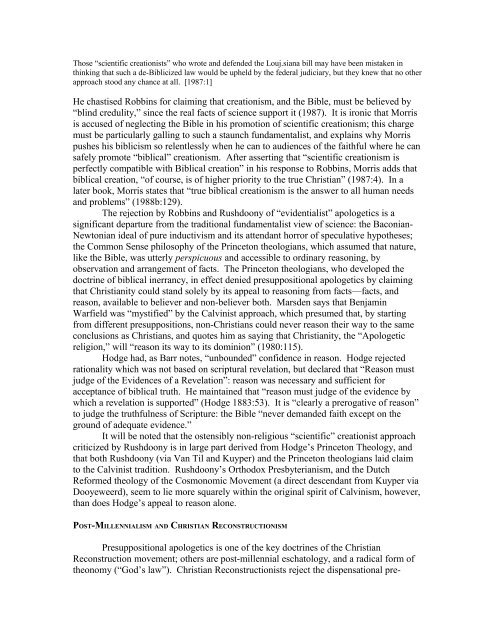Creationism - National Center for Science Education
Creationism - National Center for Science Education
Creationism - National Center for Science Education
Create successful ePaper yourself
Turn your PDF publications into a flip-book with our unique Google optimized e-Paper software.
Those “scientific creationists” who wrote and defended the Louj.siana bill may have been mistaken in<br />
thinking that such a de-Biblicized law would be upheld by the federal judiciary, but they knew that no other<br />
approach stood any chance at all. [1987:1]<br />
He chastised Robbins <strong>for</strong> claiming that creationism, and the Bible, must be believed by<br />
“blind credulity,” since the real facts of science support it (1987). It is ironic that Morris<br />
is accused of neglecting the Bible in his promotion of scientific creationism; this charge<br />
must be particularly galling to such a staunch fundamentalist, and explains why Morris<br />
pushes his biblicism so relentlessly when he can to audiences of the faithful where he can<br />
safely promote “biblical” creationism. After asserting that “scientific creationism is<br />
perfectly compatible with Biblical creation” in his response to Robbins, Morris adds that<br />
biblical creation, “of course, is of higher priority to the true Christian” (1987:4). In a<br />
later book, Morris states that “true biblical creationism is the answer to all human needs<br />
and problems” (1988b:129).<br />
The rejection by Robbins and Rushdoony of “evidentialist” apologetics is a<br />
significant departure from the traditional fundamentalist view of science: the Baconian-<br />
Newtonian ideal of pure inductivism and its attendant horror of speculative hypotheses;<br />
the Common Sense philosophy of the Princeton theologians, which assumed that nature,<br />
like the Bible, was utterly perspicuous and accessible to ordinary reasoning, by<br />
observation and arrangement of facts. The Princeton theologians, who developed the<br />
doctrine of biblical inerrancy, in effect denied presuppositional apologetics by claiming<br />
that Christianity could stand solely by its appeal to reasoning from facts—facts, and<br />
reason, available to believer and non-believer both. Marsden says that Benjamin<br />
Warfield was “mystified” by the Calvinist approach, which presumed that, by starting<br />
from different presuppositions, non-Christians could never reason their way to the same<br />
conclusions as Christians, and quotes him as saying that Christianity, the “Apologetic<br />
religion,” will “reason its way to its dominion” (1980:115).<br />
Hodge had, as Barr notes, “unbounded” confidence in reason. Hodge rejected<br />
rationality which was not based on scriptural revelation, but declared that “Reason must<br />
judge of the Evidences of a Revelation”: reason was necessary and sufficient <strong>for</strong><br />
acceptance of biblical truth. He maintained that “reason must judge of the evidence by<br />
which a revelation is supported” (Hodge 1883:53). It is “clearly a prerogative of reason”<br />
to judge the truthfulness of Scripture: the Bible “never demanded faith except on the<br />
ground of adequate evidence.”<br />
It will be noted that the ostensibly non-religious “scientific” creationist approach<br />
criticized by Rushdoony is in large part derived from Hodge’s Princeton Theology, and<br />
that both Rushdoony (via Van Til and Kuyper) and the Princeton theologians laid claim<br />
to the Calvinist tradition. Rushdoony’s Orthodox Presbyterianism, and the Dutch<br />
Re<strong>for</strong>med theology of the Cosmonomic Movement (a direct descendant from Kuyper via<br />
Dooyeweerd), seem to lie more squarely within the original spirit of Calvinism, however,<br />
than does Hodge’s appeal to reason alone.<br />
POST-MILLENNIALISM AND CHRISTIAN RECONSTRUCTIONISM<br />
Presuppositional apologetics is one of the key doctrines of the Christian<br />
Reconstruction movement; others are post-millennial eschatology, and a radical <strong>for</strong>m of<br />
theonomy (“God’s law”). Christian Reconstructionists reject the dispensational pre-

















